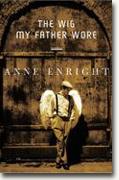The Wig My Father Wore
Anne Enright
book reviews:
· general fiction
· chick lit/romance
· sci-fi/fantasy
· graphic novels
· nonfiction
· audio books
· author interviews
· children's books @
curledupkids.com
· DVD reviews @
curledupdvd.com
newsletter
win books
buy online
links
home
for authors
& publishers
for reviewers

 |
The Wig My Father Wore Anne Enright Grove/AtlanticPress Paperback 224 pages September 2001 
|
|
"He said being an angel wasn't a free ride either. There was a lot of wrestling involved, a lot of regret. He wished, for example, that I would stop looking where his crotch kind of glittered while the rest of him glowed. He asked me how the despair was coming along. I smiled. I told him he was wasting his time on me."There is a lot of tongue-in-cheek humor sprinkled throughout, much of which will bring a smile to the reader's face. It turns out that Grace is a young woman who has lived a life filled with shame -- shame that has grown almost exponentially out of the fact that her father wears a wig and has done so for years: "We grew up with a secret everyone knew. Even the cat knew and stalked it. For years my father's wig felt like an answer. I could say 'I am the way I am because my father wears a wig.' I could say 'I am in love with you because I have told you, and no-one else, about my father's shameful wig.' This is not true. I have told strangers about my father's wig in discos. I have discovered it is not a good way to score."Another quote: "My father, on the other hand, just stopped moving his head. His neck got stiff and angry. The wig slept on top of him with one eye open, watching us. My parents' bedroom became even more secret, as if the wig were a dog at the door."This is wonderful writing, and poignant in the way it reveals how children perceive some events that others (grownups) pay little attention to. Perhaps the wig is a metaphor for the loss of the illusion that every child has and eventually discards, the notion that his/her father and mother are super-parents. The wig Grace's Da wears home one night and brings into the house (without mentioning its strange presence to anyone nor anyone mentioning it to him) might be symbolic of that moment in all children's lives when the illusion of the infallibility of their parents is shattered. Or perhaps Grace is just an obnoxious self-absorbed little woman who can't stop obsessing about her father's wig. Therein is the flaw in this still-wonderful book. It is simply difficult to like Grace. Grace's father is sick, and losing his memory, and what still dominates Grace's mind is his wig. She is incapable of seeing much else. Perhaps for Grace it is still an "answer". It permits her to keep her distance from her very sick Da, and thus avoid any responsibility for his care or for offering him any love or solace. It is hard to like Grace and it is equally hard to like her co-workers who are all glib and wise-cracking "modern" characters. They ultimately are people we don't care to know. Grace and Marcos and Frank and others work for a television studio putting together a game show. This is another illusion, this time one she helps create. The show is being threatened with cancellation and that is another worry for Grace. What will she do afterward? Much of the book is centered about Grace's worries, some real and some imagined, many filled with self-pity. She has an uncanny ability to judge reality, to separate fact from illusion. But it's actually illusions she may want: "She (Grace's mother) says she wants to remember things as they really were. As if she didn't know, that seeing things as they really were is the greatest revenge."Grace is a dreamer stuck in the modern age of "knowing". Illusions are not what her cynicism offers her and yet illusions are exactly what she wants. She needs them, to soften the pain of living. Perhaps we all do. The Wig My Father Wore is a wonderful book; if only the characters were easier to like. Less self-absorbed. Because of that, it is difficult to be fully drawn into Grace's world. Rather the book leaves the reader feeling outside the events taking place, just looking in. The illusion of "living inside a novel" is one readers look forward to. Unfortunately, this one doesn't grant full entrance. Still, it is a book that offers much pleasure in its humor and its very talented writing. © 2002 by Mary B. Stuart for Curled Up With a Good Book |
| Also by Anne Enright: |
|
|
|
 Click here to learn more about this month's sponsor! |
|
| fiction · sf/f · comic books · nonfiction · audio newsletter · free book contest · buy books online review index · links · · authors & publishers reviewers |
|
| site by ELBO Computing Resources, Inc. | |
 The book opens with a chapter entitled "Stephen". Stephen is an angel, the soul of a person who committed suicide and who must now earn his wings. He drops by ringing the bell of Grace's apartment and asking for a cup of tea. We learn immediately that Grace is a woman given to self pity and despair:
The book opens with a chapter entitled "Stephen". Stephen is an angel, the soul of a person who committed suicide and who must now earn his wings. He drops by ringing the bell of Grace's apartment and asking for a cup of tea. We learn immediately that Grace is a woman given to self pity and despair: